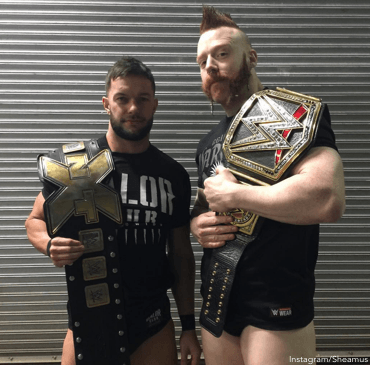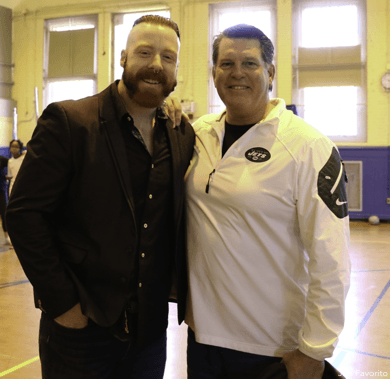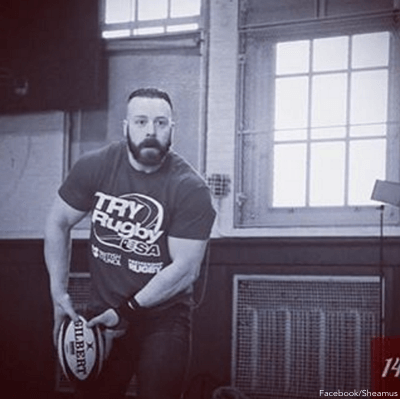Before Sheamus was a four-time WWE world champion, he stood out at the National College of Ireland. Members of the rugby team envied his size and strength, and courted him to the field even though he did not have much experience playing the sport.
"Gaelic football is a very Irish sport, which I played," Sheamus says. "When I got to college, I got an opportunity to play because we were short a couple players. They put me on number six on a blind-side flanker, and the basic instruction was if I don't have the ball, tackle who has the ball as hard as I can, and when I have the ball, run as fast as I can towards the opposition's area and try to score."
(For an explanation of what the heck Sheamus means by blind-side flanker, read here).
Sheamus, 38, was known by his birth name, Stephen Farrelly, back then. At around the same time, John Cena was an NCAA Division III All-American center for Springfield College. The Rock just finished a career at Miami and tried to make the CFL. Roman Reigns was still a few years from a tenure at Georgia Tech, which was followed by practice-squad stints with the Vikings and Jaguars.
"The physicality prepared me for the WWE ring," Sheamus says. "A lot of guys have played college football and were in the NFL, but for me, it made my transition a lot easier, and people say I'm one of the toughest guys in WWE. I have rugby to thank for that."
Sheamus recently popped into a New York City gym to help direct a rugby clinic with local students. English rugby clubs London Irish and Saracens will meet at Red Bull Arena in New Jersey on March 12. Sheamus worked with coaches to portray correct techniques, including tackling, to the youths.
"I was pretty good," Sheamus' says of his skills in college. "I got it right away. It came very natural to me. I had a lot of help from my teammates. It's a great team sport. Everybody looks out for each other in there. It's a family thing.
"I was known for hitting people really hard, tackling people really hard. Rugby, I want to give it a good platform here because there's no helmets involved, no shoulder pads, there's a lot of cardio involved, aerobic ability, and there's two halves of 40 minutes. It's a very passionate game and there's a lot of sportsmanship with rugby. There's no other game that when the game is over, the winning team applauds the losing team, then they switch around and applaud the winning team and after the game, you can see them together, having drinks, hanging out, and discussing the game. It's a sportsmanship that I feel is kind of lost these days."
In the United States, rugby is commonly described as a sibling sport to American football. This leads to both positive and negative stigmas. Sheamus, in promoting rugby in his adopted United States, addresses the safety issues head-on, even if his sport does not call for such head-on combat.
"I think the only thing people are worried about is they think it's such a violent sport," Sheamus says. "To me, it's a physical sport, not a violent sport.
"I feel it's less dangerous than NFL. Obviously, the NFL has its own unique thing and I started watching it since I came to America, but there are no helmets and there are no pads. I feel like without the helmets, you're less likely to go in headfirst at the tackles. I never had a concussion playing rugby. A lot of my fellow players didn't have concussions. I never had any concussion issues. You're less likely to go into those dangerous situations when you're not wearing helmets and pads. It's still very physical. You hit hard, but the more stuff you have on you, the more likely you are to jump into situations you wouldn't normally jump in to. Players don't go into those situations they go into in college football or the NFL."

Says the man who breaks chairs over people's heads for a living.
Greg Buttle, a linebacker for the New York Jets from 1976-1984, was also on-hand to assist the clinic. Buttle, who admits he still has a lot to learn about rugby, looks at the sport through the opposite lens.
"They're similar in the fact they are contact sports," Buttle says. "They're dissimilar in the fact the NFL is a collision sport. This is a contact sport. This sport's about getting out of the way. The NFL is about getting in the way. It takes the same type of athlete: Fast, strong, good balance."
Buttle, now a Jets analyst on New York TV and radio, says rugby presents obvious risks, like the NFL.
"There are different injuries in rugby than in football," Buttle says. "I'm sure there are a lot more guys wrecking teeth and breaking jaws in this sport than the NFL. You still have head injuries no matter what you do, so I don't know how much different that is other than you don't hit your head into anybody on purpose. That's accidental. In the NFL, it's on purpose."
In the gym with Sheamus and Buttle, but without much media attention, was Mike Petri. The son of a former Villanova college football player, Petri found rugby while growing up in Brooklyn. The 31-year-old stuck represented the U.S. at the 2007, 2011 and 2015 Rugby World Cups. He now coaches the rugby team at his alma mater, Xavier High School in Manhattan, where he also teaches biology, physics and algebra.
"There's the illusion that because there is not as much equipment, the game is much more violent," Petri says, comparing rugby to football. "The exact opposite is probably the case. The equipment the players wear in American football creates I think an illusion of invincibility. Whereas in rugby, you know without that equipment there, you need to be very technically sound with everything you do in a contact situation. Safety is paramount.

"I think that's obvious with a lot of NFL teams and college teams now, adopting some of the principles of contact situations in rugby. The two sports can complement each other."
Petri published a children's book, R is for Rugby: An Alphabet Book, last June, to promote the sports to a new generation of American rugby enthusiasts.
Sheamus' promoting rugby makes sense for a different reason. He is a displaced Irishman in the U.S. A rugby presence in the U.S. can make Sheamus feel more at home.
"Ireland, my national team, and obviously I have to be favorite toward Leinster because I grew up in Dublin," Sheamus says of his favorite team. "My Ma is from County Clare, so she's a Munster fan, so she keeps sending me Munster jerseys all the time, trying to convert me to Munster. Obviously I have a real soft spot for London Irish as well. I was over at the facility in 2013. They took me all around, got a lot of cool merchandise and awesome jerseys, and I had a training session with the players. I don't have like one team, but I'm a big fan of London Irish and the [New Zealand] Warriors."
What about rivals? After all, Sheamus played at the college level. There had to be some schools and clubs he despised.
"Every team was a rivalry," he says. "We had games in college where we got stuck. It was a very physical game, but afterwards, we're all in the bar, drinking beers, drinking sodas, just talking to the guys, chilling out, talking about the game."
Last week, in a gym with NYC youths, that was the kind of vibe Sheamus gave a group of students: Competitive, fun and respectful. The big, bad WWE star can prove rugby is not a big, bad, violent sport.
-- Follow Jeffrey Eisenband on Twitter @JeffEisenband.






